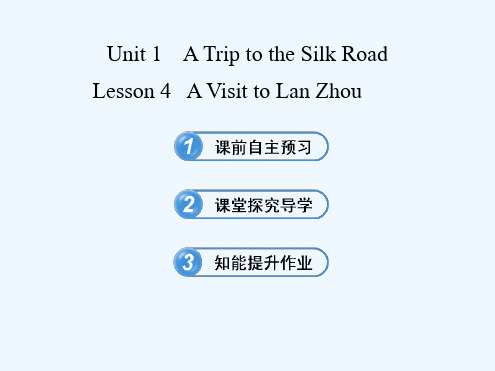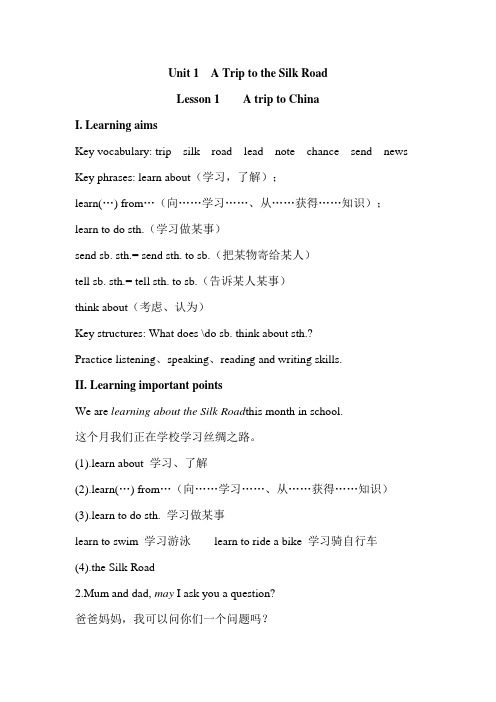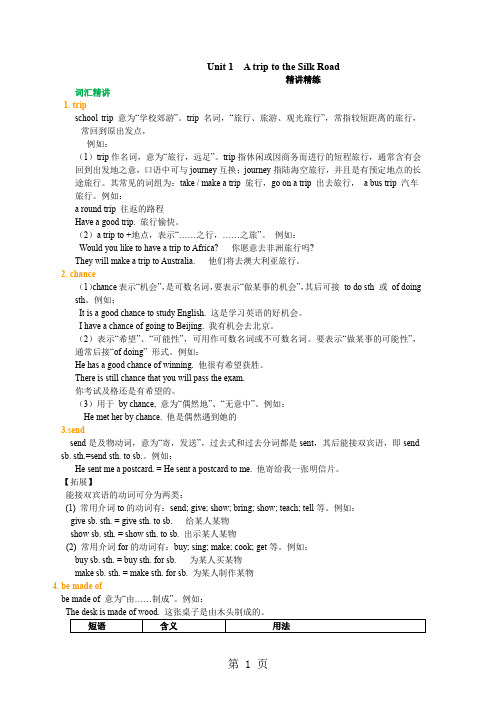Unit 1 A trip to the Silk Road
- 格式:ppt
- 大小:9.30 MB
- 文档页数:11



Unit 1 A Trip to the Silk RoadLesson 1 A trip to ChinaI. Learning aimsKey vocabulary: trip silk road lead note chance send news Key phrases: learn about(学习,了解);learn(…) from…(向……学习……、从……获得……知识);learn to do sth.(学习做某事)send sb. sth.= send sth. to sb.(把某物寄给某人)tell sb. sth.= tell sth. to sb.(告诉某人某事)think about(考虑、认为)Key structures: What does \do sb. think about sth.?Practice listening、speaking、reading and writing skills.II. Learning important pointsWe are learning about the Silk Road this month in school.这个月我们正在学校学习丝绸之路。
(1).learn about 学习、了解(2).learn(…) from…(向……学习……、从……获得……知识)(3).learn to do sth. 学习做某事learn to swim 学习游泳learn to ride a bike 学习骑自行车(4).the Silk Road2.Mum and dad, may I ask you a question?爸爸妈妈,我可以问你们一个问题吗?May I…? 此句式表达有礼貌地请求对方允许,语气十分委婉,还可以表达为:Could I \ Can I?其肯定回答常用:Yes.可以。
\ Sure.\ Certainly.当然可以。



Unit 1 A trip to the Silk Road精讲精练词汇精讲1. tripschool trip 意为“学校郊游”。
trip 名词,“旅行、旅游、观光旅行”,常指较短距离的旅行,常回到原出发点,例如:(1)trip作名词,意为“旅行,远足”。
trip指休闲或因商务而进行的短程旅行,通常含有会回到出发地之意,口语中可与journey互换;journey指陆海空旅行,并且是有预定地点的长途旅行。
其常见的词组为:take / make a trip 旅行,go on a trip 出去旅行,a bus trip 汽车旅行。
例如:a round trip 往返的路程Have a good trip. 旅行愉快。
(2)a trip to +地点,表示“……之行,……之旅”。
例如:Would you like to have a trip to Africa? 你愿意去非洲旅行吗?They will make a trip to Australia. 他们将去澳大利亚旅行。
2. chance(1)chance表示“机会”,是可数名词,要表示“做某事的机会”,其后可接to do sth 或of doing sth。
例如:It is a good chance to study English. 这是学习英语的好机会。
I have a chance of going to Beijing. 我有机会去北京。
(2)表示“希望”、“可能性”,可用作可数名词或不可数名词。
要表示“做某事的可能性”,通常后接“of doing” 形式。
例如:He has a good chance of winning. 他很有希望获胜。
There is still chance that you will pass the exam.你考试及格还是有希望的。
(3)用于by chance, 意为“偶然地”、“无意中”。
例如:He met her by chance. 他是偶然遇到她的3.sendsend是及物动词,意为“寄,发送”,过去式和过去分词都是sent,其后能接双宾语,即send sb. sth.=send sth. to sb.。
Unit 1 A Trip to the Silk Road Lesson 1 A Trip to China一、教材分析1. 教学目标● 语言知识(1)掌握词汇:trip,silk,road,lead,note,chance,send,news(2)短语及句型:guess what,learn about● 语言技能能够用英语谈论旅游的话题。
● 情感态度培养学生有兴趣说英语,积极参与课堂活动,大胆发言,敢于用英语谈论自己的旅行经历● 学习策略积极运用所学英语进行表达和交流。
2. 教学内容(1) New words and phrases(2) understand the meaning of text(3) Structures: May I ask.....? May I go with you...?Grammar: using “will”3. 教学重点本课掌握的词汇与句型4. 教学难点learn about,send,plan(动词和名词的用法区别)二、教学准备多媒体、图片、英汉字典三、教学步骤Step I Class Opening (5 minutes)1. Warm up2. ReviewAsk the class to listsome examples of when they might use “May I...?” and they should respond to those questions。
Examples:May I borrow your book?May I go with you?May I watch TV?Response:Yes, you may.\ No, you may not.Step II New Concepts (40 minutes)1. Learn some new words2. Present: Tell the students that today they will learn how to ask for permission and how to use the word “will” to express something that is going to happen or something you want to in the fu ture. For example: “I am standing. I will sit later.” Ask the class to give some more examples.3. Listen: Let’s Do It! No.1.(1) Play the tape for Lesson 1(Play it once and ask the students to listen.)(2) Discuss the answers to Let’s Do It!(3) Play the tape for Lesson 1 a second time and have the class read aloud along with the tape.4. Review what was learned. Ask the class to point out the “May I...?” and “will” sentences in the lesson.5.Group work:(1) Have the class read and answer the questions i n Let’s Do It! No.2.(2) Discuss the answers to Let’s Do It! No.2.6. Practice and playPractice asking for permission using the new vocabulary words.7. Pair work: Ask the students to look at Let’s Do It! No.3. and find the Chinese meaning for each word in the box. (Every group of students have an English-Chinese dictionary to complete this task.8. Read the dialogue and find out language points.9. Do exercise.10. Task(1) Read Let’s Do It! No.4. Split the students in groups to complete the task.。
第1—6课课本要点解析1. 【原句再现】Mum and Dad, may I ask you a question?【解析】情态动词may意为“可以”,在疑问句中与第一人称I 或we 连用表示请求的含义。
如:May I put my books here? 我可以把书放在这里吗?May we go to Shanghai with you? 我们可以和你一起去上海吗?2. 【原句再现】I will send Li Ming an e-mail and tell him the good news.【解析】表示“送给某人某物”可用句式send something to somebody,也可用send somebody something。
如:We’ll send our teacher some flowers.= We’ll send some flowers to our teacher. 我们要给老师送些花。
【拓展】除动词send 外,动词give, show, bring, take, pass也有这种用法。
如:Please give me a new pencil. = Please give a new pencil to me. 请给我一支新铅笔。
3. 【原句再现】But we don’t have enough time to see it all.【解析】句式have time to do something 意为“有时间做某事”,此例句中使用的是它的否定形式。
如:They have a lot of time to play with you. 他们有很多时间和你一起玩。
4. 【原句再现】How far is it from Beijing to Xi’an?【解析】询问距离用疑问词how far。
如:How far is it from here to the zoo? 从这里到动物园有多远?【拓展】how long用于询问长度或时间长短。